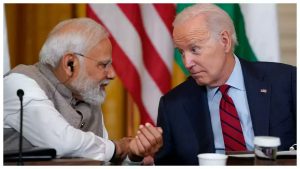When you hold the world’s largest electoral exercise, the outcomes can be perplexing and paradoxical. That’s what happened this week in India’s colossal parliamentary elections.
After weeks of voting, Prime Minister Narendra Modi’s Hindu nationalist Bharatiya Janata Party (BJP) emerged as the largest party in Parliament. Modi is now set to be sworn in for a historic third term this weekend. Yet, the victory was bittersweet: The BJP lost over 60 seats from its haul in the previous elections in 2019. It no longer enjoys a majority in parliament, which means that Modi will have to rely on the support of coalition allies to rule.
Amid the numbers, there were signs of chastisement of Modi personally and a repudiation of his political use of Hindu nationalism. Modi was reelected from his constituency in the holy town of Varanasi. But his victory margin was among the lowest ever in percentage terms for a sitting Indian prime minister. By contrast, Modi’s arch-rival, Rahul Gandhi of the opposition Congress party, won two separate seats — each with over twice the victory margin that Modi managed in Varanasi.
Meanwhile, the BJP lost in the constituency that houses the Ram temple. It also lost in the constituency in Rajasthan where Modi had infamously called Muslims “infiltrators” this April.
What might this turn of events mean for the world and for Modi’s approach to foreign policy in his third term?
Over the last few years, Modi had redefined India’s practice of foreign policy, primarily by reorienting it toward the service of Hindu nationalist goals. His election campaign had also heavily leveraged foreign policy, seeking to portray Modi as a global statesman with universal appeal. One of the BJP’s campaign videos even went so far as to claim that Modi had “stopped” the war in Ukraine.
But in the end, this popularization of foreign policy failed to reap any visible dividends. In large parts of the hinterland, concerns over unemployment and lack of socioeconomic mobility trumped Modi’s promise to deliver India to civilizational glory on the world stage. For the immediate term, therefore, domestic concerns might dominate Modi’s plate, possibly resulting in a more inward-looking government in New Delhi for at least the next few months.
Whatever course Modi chooses to take, the world will certainly face a very different government in New Delhi to the one it has dealt with over the past decade. This new era is uncharted territory for Modi and he enters it grossly unprepared. Since 2001, Modi has served as a chief minister for 13 years and prime minister for the last ten. Yet, in all that time, he has never had to rely on coalition partners to maintain a majority in the legislature.
That also means that India’s foreign partners will have to readapt to the reality of coalition politics. Over the last few years, much of the West chose to build a personal rapport with Modi even as he cracked down on civil liberties and political opposition in India. The rationale — albeit largely unrewarded — was that if Modi is appeased and exalted with praise, the West may secure strategic cooperation and concessions from him.
That personalized approach will no longer fit the bill. With the return of parliamentary politics and fickle-minded coalition partners propping up the new government, India’s foreign policy ecosystem has now widened beyond Modi’s personal vision. The world will therefore have to engage with a far wider cross-section of India’s political spectrum in shaping the future course of India’s foreign policy.
Some observers in the West fear this new era, particularly in the economic space. Investors worry that with Modi’s decision-making authority now constrained, reforms and initiatives may move less quickly through India’s infamous bureaucratic quagmire.
But that may yet be for the best. Contrary to popular perceptions, India’s economy has historically performed better under coalition governments. Some of its most sweeping reforms in the 1990s, for instance, had been made possible through coalition politics. The reason for this counterintuitive trend may be that in a country as vast and diverse as India, coalition politics can often help build broad-based support for politically difficult reforms by producing more public debate and involving more stakeholders.
Modi’s own patchy record as an economic reformer bears witness to this. On multiple occasions, Modi had to roll back laws — reforming land acquisition and the agricultural sector — because a lack of discussion in Parliament had inevitably resulted in widespread street protests.
There could also be other potential good news for the West: the resurgence of parliamentary democracy may temper India’s more recently belligerent practice of diplomacy.
Over Modi’s previous term, India had effectively taken a holiday from the liberal international order. As Modi centralized authority in New Delhi and sought global validation for Hindu nationalism, India moved sharply away from Western norms on democracy, human rights and international law. Modi’s muscular nationalism resulted in a more risk-acceptant foreign policy, including attempts to target dissidents abroad and monitor the diaspora. The weakening of democratic institutions in India also put New Delhi on a warpath against multilateral institutions, which Modi perceived to be dominated by Western norms. All of this narrowed common ground between India and the West, even as New Delhi increasingly began to speak of the world in terms used by Beijing and Moscow.
It’s yet unclear how Modi’s new government would approach these issues. But it wouldn’t be unreasonable to assume that many of these contentious policies would be more difficult to pursue, now that Modi must depend on the support of allies who do not subscribe to his Hindu nationalist worldview.
India’s voters may have returned Modi to power once more. But one might still expect New Delhi to speak and behave somewhat differently on the world stage.

































